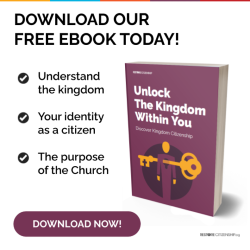Discover what the bible has to say about the purpose, types and requirements of an authority.
This quarter Kingdom Insight begins to explore the five elements that constitute a kingdom. We will look at the unique characteristics the four elements comprise of, and how these contribute to our Kingdom citizenship.
The dictionary defines a kingdom as:
1. a state or government having a king or queen as its head.
2. anything conceived as constituting a realm or sphere of independent action or control: the kingdom of thought.
The word kingdom is made up of two words “King” & “Domain” or “The King’s domain”.
King = Governing authority.
Domain = Territory.
The King is an individual through whom certain characteristics and culture are personified. At the centre of a kingdom is the man/women who governs through particular qualities, characteristics and culture. It is safe to say that whilst we have a variety of different forms of government, from autocracy, monarchy, oligarchy, democracy, republic and anarchy, these types of government are heavily influenced by the position and personality of one person, whether it be king, queen, president, prime minister, military general, dictator or revolutionary.
The influence comes directly from the individual’s personal standards, and reflects onto the society in which they govern through legislation. Those who take such powerful positions in society seek to drive through changes in legislation to accomplish what they believe will make society a better place.
With every presiding authority comes the associated residency, i.e. Number 10 Downing Street or the White House. An official residence is the residence at which heads of state, heads of government or other senior figures officially reside.
Government’s consisting of a monarchy tend to have residents that comprise of both their dynasty and throne. A dynasty is a succession of persons belonging to the same family, who, through various means and forms maintain power, influence or authority over the course of generations. Most often the term has been used to refer to a succession of monarchs or feudal nobles who reign over one or more territories by hereditary right.
However a dynasty may also be thought of as a series of related individuals who exercise power or dominance unofficially over a territory or people, or achieve prominence in an industry, academic field, religion, cultural activity, or other sphere of endeavor.
A ruling or territorial dynasty is also often called a 'house' (e.g. 'House of Saud', 'House of Windsor)'. The term is also used to describe the era during which a family reigned,
Biblical Kings
The first element that constitutes a kingdom can be clearly identified with the nature in which the Old Testament and New Testament relate. The Old Testament identifies through Israel’s history the rise and fall of a nation in the land of Canaan. By the Lord’s sovereign hand and his servant Moses the nation of Israel rise up from the slavery of Egypt and are delivered out of bondage into the glorious liberty of citizenship.
Israel were in actuality delivered from slavery under one ruling government to citizenship under another ruling government. Under Joshua the Israelites initial conquest of Canaan was successful, but after his death, the conquest stopped and the Israelites plummet into continual apostasy. Through this period the Judges govern. As frustration sets into the nation they cry out to the Lord for a government that resembles the nations around them, the Lord God grants their request through the prophet Samuel and anoints Saul as the first King.
From this point a monarchy is firmly rooted in the minds of the Israelites and with this the house of Saul (residency) becomes the central place from and through whom the nation is governed. After the failure of Saul, God appoints a man in whom he builds the characteristics that will underpin the society he desires to see. Samuel anoints David and progressively the house of David arises to take the place of the weakening house of Saul.
Through the Davidic covenant the golden age of Israel is realised and prophecy fulfilled through his dynasty (Solomon). However as the dynasty continues and the consequences of sin take hold, the house of David weakens and the glorious kingdom that once was falls into disrepute. What was to be a nation sought after becomes a nation divided and rejected.
From this point the prophets begin to call upon the Lord and he answers by promising them a new King and a new kingdom. It is within this context that the Son of God enters into the world as God’s appointed King. Luke 1:32-33 32 He will be great, and will be called the Son of the Highest; and the Lord God will give Him the throne of His father David. 33 And He will reign over the house of Jacob forever, and of His kingdom there will be no end.”
Luke 1:69 He has raised up a horn of salvation for us in the house of his servant David. The Israelites anticipate the coming of their Messiah and specifically seek for one who’s heritage stems from Davidic roots and characteristically reflects the personality of David.
The greatest of the prophets John the Baptist (Matthew 11:11) realised the importance of this when he proclaimed:
Matthew 3:1-2 “In those days John the Baptist came preaching in the wilderness of Judea, and saying, “Repent, for the kingdom of heaven is at hand!”
Note: When ever a dignitary enters a territory, the territories highest ambassador must prepare the way both for the citizens and the dignitary. If a king or a president were coming to an area the local authorities would prepare the environment in accordance with the dignitaries requirements.
John the Baptists declaration was not purely religiously motivated; it was a decree identifying the arrival of a kingdom, because the King would soon be entering the territory. It is into this that Christ steps in and heralds the same message to the people.
Consider the following statements of Christ:
Matthew 4:17 'From that time Jesus began to preach and to say, “Repent, for the kingdom of heaven is at hand.”
Matthew 12:28 'But if I cast out demons by the Spirit of God, surely the kingdom of God has come upon you.'
Matthew 18:23 'Therefore the kingdom of heaven is like a certain king who wanted to settle accounts with his servants'
Matthew 24:14 'And this gospel of the kingdom will be preached in all the world as a witness to all the nations, and then the end will come'
Luke 12:31 'But seek the kingdom of God, and all these things shall be added to you.'
Luke 12:32 “Do not fear, little flock, for it is your Father’s good pleasure to give you the kingdom.'
Luke 18:17 'Assuredly, I say to you, whoever does not receive the kingdom of God as a little child will by no means enter it.”
Luke 22:29 'And I bestow upon you a kingdom, just as My Father bestowed one upon Me'
Christ’s intent and purpose was that through him prophecy would be fulfilled; the house and rule of David would indeed be restored and raised to a significantly higher plain of authority and sphere. Read Acts 15:16
The prophets looked forward to the new kingdom. The people desired the age of David’s dynasty but the authorities were not ready for his appointed and successors personality.
Of his appointment prophesy states:
1 Why do the nations rage, And the people plot a vain thing?
6 “Yet I have set My King On My holy hill of Zion.”
Of the people they stated:
Matthew 12:23 All the people were astonished and said, 'Could this be the Son of David?'
John 7:42 Still others asked, 'How can the Christ come from Galilee? Does not the Scripture say that the Christ will come from David's family (dynasty) and from Bethlehem, the town where David lived?'
Of the authorities they stated:
Matthew 21:15 But when the chief priests and the teachers of the law saw the wonderful things he did and the children shouting in the temple area, 'Hosanna to the Son of David,' they were indignant.
Of himself Jesus stated: “You say correctly that I am a king” (John 18:37).
Of the Apostles they reasoned: Acts 2:28-30 “Men and brethren, let me speak freely to you of the patriarch David, that he is both dead and buried, and his tomb is with us to this day. 30 Therefore, being a prophet, and knowing that God had sworn with an oath to him that of the fruit of his body, according to the flesh, He would raise up the Christ to sit on his throne'Romans 1:3 concerning His Son Jesus Christ our Lord, who was born of the seed of David according to the flesh.
It is evident through the New Testament that the apostles identified with Christ as their king and relate with the people around them as his citizens.
For King and for country...





